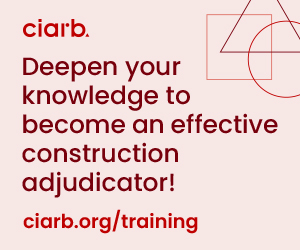Dispute resolution can improve the construction industry says Susan Francombe FCIArb

Susan Francombe FCIArb has worked in the construction industry for over 30 years as a dual-qualified chartered civil engineer and registered barrister. She is the first female chair of The Adjudication Society and is the first civil engineer to hold the post.

Route into adjudication
As the size of the projects Susan worked on increased as a civil engineer, she realised she needed a better understanding of law and contract management. When someone suggested she study and sit the Institution of Civil Engineers examination, it fired up a general interest in the law. She saw an advertisement for a college that allowed her to combine working onsite with weekend law lectures and never looked back.
“My specific interest in adjudication came from working for a well-known main contractor. We saw increasing numbers of sub-contractors using adjudication to resolve payment disputes, and I was drafted in to handle these. The Ciarb Accelerated Route then gave me the opportunity to become both a Fellow and gain a qualification in adjudication,” she explains.
Dispute resolution in construction
Since becoming a Ciarb Fellow, Susan is passionate about how the dispute resolution sector can improve the construction industry. She highlights two ways in which dispute resolution can make a difference. Firstly, by providing the most appropriate mechanisms to resolve any disputes that arise, letting the parties carry on with what they do best. Secondly, it can provide valuable lessons on preventing the same problems from occurring in future projects. The King’s College 2023: Construction Adjudication in the UK report shows that in 42% of adjudications, inadequate contract administration is the leading cause. “We need to show the industry the importance of contract administration to the success of their projects,” she concludes.
Susan explains there are three ways to improve awareness of the benefits of adjudication across the building and construction industry; “Education, advocacy, and collaboration.”
The first is to ensure all sectors of the construction industry have access to resources and information about dispute resolution. “Many small and medium firms see adjudication as just another way of spending money on lawyers without realising lawyers are often unnecessary. They need to know how to get good quality advice to enable them to use adjudication as an effective dispute resolution tool,” she says.
The second is promotion. “I still find businesses who have never heard of adjudication or, if they have, don’t think it is for them,” says Susan. If firms share case studies of successful adjudication, particularly around payments, this will increase awareness and interest.
The final element is collaboration with industry bodies. “This can help both spread knowledge of adjudication to their members and provide valuable feedback to adjudication practitioners on how the process is perceived and how it could be improved,” she explains.
Diversity in Adjudication
There is a lot more to do to achieve gender equality in adjudication. The 2022 King’s College London and Adjudication Society Report showed that less than 8% of adjudicators are women – and the 2023 report found it impossible to find a comparable average for this year due to a lack of transparency. “The Adjudication Society launched the Adjudication Pledge and Women in Adjudication to encourage more women to qualify and apply for panels, and we are now operating both a formal and ad hoc mentoring scheme (open to all members, not just women) so that those interested can find out what it is like to be an adjudicator,” says Susan. “We have also published details of how to apply for panel membership with many of the Adjudicator Nominating Bodies (ANBs), something that was not always clear before.”
As the first woman chair and civil engineer of the Adjudication Society, her key message is to encourage transparency and diversity in the adjudication process.
“Transparency not only applies to the ANBs but also to adjudicators in relation to disclosure and conflicts of interest. Actions to improve diversity in relation to women have been put in place, but data and action are lacking with respect to other protected characteristics.
“Rather than just sticking to legal definitions, I think diversity incorporates the wide variety of experiences and backgrounds of those of us in the construction industry. We should all feel welcome and valued,” she concludes.
Ciarb is an independent, charitable membership organisation committed to supporting the effective resolution of disputes. Ciarb champions all aspects of dispute resolution across arbitration, mediation and adjudication, setting robust ethical standards. Ciarb delivers learning and networking opportunities, qualifications, mentorship, research and resources, events, and best practice guidance for its members and dispute resolution practitioners globally. Today, Ciarb has 43 Branches that connect over 17,500 members across 150 jurisdictions around the world. Learn more about our adjudication courses here.

